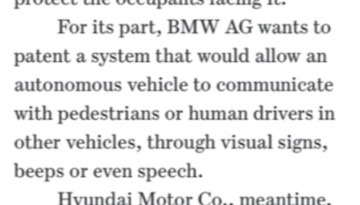The Self-Driving Car Dilemma
Joke
Q: What's getting on in years and is delicious smothered in onions?
A: Old Man Liver
That's my age joke. It's relatively harmless and very short. I heard it first when I was a young man. I am now a "senior citizen" or, as I might have been characterized when first I heard that joke, an "old man." If I were somehow still a young man, I couldn't tell that joke to me because we live in a more sensitive age. But it's an impossible somehow, so I now settle for being "elderly" which may be even worse than "old."
So far, at least, as many elderly people aver, I don't "feel my age." I can see my toes, climb and descend stairs with equal facility, and am even a poster boy* for cataract surgery. All is well. For now.
Why the Age References?
Self driving cars, also called autonomous vehicles, is why. I've been thinking a lot about their being on the temporal horizon. The day will eventually come when I have to figuratively surrender my driving and flying licenses. Whether "have to" comes after "really, really should" depends critically on how soon I won't need them because of autonomy. Since moving out west and giving up my commuting ways, I've found that driving is no longer the habit that it used to be. Trips nowadays tend to be either very short or very long. The short ones compete with the salubrious effect of walking to my destination; the long ones compete with "do I really want to waste all that time"? Either way, I don't ever want them to compete with the "will I be able to find someone to drive me?" question. If self-driving cars are available before I need to ask, then I've won the competition.
I'm a technology optimist. I've heard guesses that fully autonomous vehicles will be available as soon as 2019 to, essentially, never. I prefer to think that "never" is ridiculous, and that, even if 2019 may be a bit soon, it will be in the very early '20s. However, I recently read an article in a respected journal, IEEE Spectrum, that suggests otherwise, and does so with reasonable arguments. The article, by Prof. Rodney Brooks, is entitled "The Big Problem With Self-Driving Cars Is People," subtitled "And we'll go out of our way to make the problem worse."
Whoopsie
He's right. There are many reasons that self driving cars won't work, at least in the initial phases of their adoption when they are mixed with human-driven vehicles. Among them are the selfishness of the rich and that people, not just the rich, are jerks. To be a bit more specific, here are a few of his issues:
- Will they be able to "communicate" with people as drivers and pedestrians do now, by making eye contact and gestures? (No, not those gestures.)
- Will they be able to pass pedestrians walking on a snowy road as human drivers can, carefully, do?
- Will selfish "drivers" have their car circle the block many times and tie up traffic instead of finding legal parking?
- Will two car families send their robot car ahead to find legal parking long before an event, then drive to the event in their second car and send it home? (I would!)
- Will drivers and pedestrians take advantage of rigorous safety algorithms to "tease" autonomous cars, creating safety hazards for others while slowing down traffic?
Maybe, maybe, yes, yes, and yes.
Which issues, if they prevent the advent of autonomy, make this old man driver unhappy. I guess I shall have to do something to help. How modest my proposal?
Humans Ruin Everything
I don't actually have a bumper sticker that says "CAUTION - I DRIVE LIKE YOU DO." I do still have a bumper, although it seems to share my indifference to the occasional scrape or ding. How long will that bumper survive? With an autonomous car, as the story goes, pretty much forever. The ever present "regulators" will see to that. Self driving cars will never be approved for use on our streets until the algorithms are essentially foolproof. Someone steps in front of the car, it stops. If a situation occurs that might cause an accident, the autonomous car will be deferential to the extent of ignoring the honking from behind and the exhortations from within. At least in city driving, this will be a fatal flaw.
Having learned to drive in New York City, my personal brand of autonomy involves qualified deferral to crossing pedestrians. The degree of qualification varies from NY to AZ to CA, but somehow it works. If I see someone by the side of the road, I have (usually) the ability to determine if he will galumph into the street to the detriment of all. I have mastered the alternate merge, complete with eye contact.
But I reluctantly admit to being human. I've never driven drunk, but I have driven tired, which often can be worse. I have driven distracted more times than I should, in past years due to testing an aircraft moving map display in the car, in recent years due to other gadgetry. Some of the aforementioned bumper blemishes were my fault, some the fault of other human drivers. In other words, I do drive like you do. We expect autonomous vehicles to be far safer than those driven by humans, and we need to make them immune to all the perils mentioned in the Brooks article in Spectrum. And we want them NOW(ish).
How Do We Get There?
Let's assume that it is possible to make the perfect self-driving car. Never get tired or drunk? Easy! How about other human foibles, such as taking curves too fast? Again, easy. Rainy conditions? Maybe not so much, snow even less so. But not impossible. Cautious enough to never hit another vehicle or a pedestrian? Sure.
But...traffic will grind to a standstill as aggressive drivers and teasing pedestrians have their way with wimpy robot cars. The alternate merge? Hopeless! Who's going to be polite to a robot? How do we avoid this impasse? Eventually, outlaw human drivers, of course. But in the interim, I think the the robots also have to drive like you and I do. Maybe not quite as poorly, maybe never drunk or tired, but flawed nonetheless. After our software achieves "perfect safety," we can just dial it back a bit. Deliberately run into the road 199 times out of 200 the car defers to you, but one time it does not. Are you feeling lucky?
I can hear the screeches and howls from the regulators if this is implemented. But the response will be that they are still much safer than human drivers. How much safer is safe enough? Over a decade ago I made an observation about the effect of reducing a speed limit on life. (At least I'm not being a pest about it.) Long blogitem summarized, the life saved, if any, is thrown away by the wasted travel time. Looking at the autonomous driving question, there will be a number, or more likely a range of numbers, which will optimize the benefits of autonomy. If the cars are no safer than present drivers, to pick one extreme, they will never be approved, nor should they be. If the cars are almost perfectly safe, to pick the other, traffic will never move, for all the reasons given in the article. But how about if they are twice as safe, or better expressed, half as unsafe? Ten times as safe? I don't know the correct number, but it will be empirically determined, willy-nilly, as the cars start appearing on the roads and fatalities plummet.**
Unless, of course, we're too wimpy to give them a chance.
Your Government In Action
Will "the regulators" accept a deliberately imperfect autonomy algorithm? I'd like to think so. <sarcasm> Consider how enthusiastic the FTC is about "vaping" as a substitute for smoking. </sarcasm> There will be political push back from all sides. It's been seriously suggested that robots be taxed to pay for retraining workers, for one bizarre example. As compelling as the Brooks article may seem, I think there are solutions, some fairly simple, for all his putative dilemmas. I'm lucky or unlucky enough to be at a physical age where the timing of the availability of autonomous vehicles may be personally important to me. I think technical ingenuity and some regulatory common sense (oxymoron alert?) will bring mobility to my generation before it's too late. I'm not eager to spend my declining years, immobile at home, smothered in onions.
Flying Cars
I mention both my driving and flying license above because of a throwaway line at the end of the Brooks article: And Flying Cars? Forget about 'em. Needless to say, I (and George) disagree. But that's a subject for a future blog.
* I thought hard before writing "poster boy," given the age-related context. I'm rejecting "poster oldster" but perhaps I'm being hasty.
** Some of the other points in the Brooks article, but by no means all, can be resolved by a few LEDs that substitute for eye contact. Does the car "see" you on a snowy road or about to step off the pavement? A friendly blink lets you know it's OK. No blink, well, you'd better be feeling lucky!
| Update 18 September 2017 |
| As foretold in the double-asterisk prophecy above, it looks like BMW managed to think of this even before I did. The little clip from the Journal today mentions a number of patents the auto makers have filed. I remain optimistic. |  |



